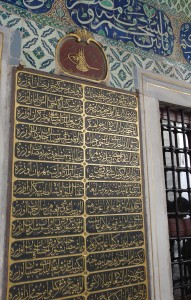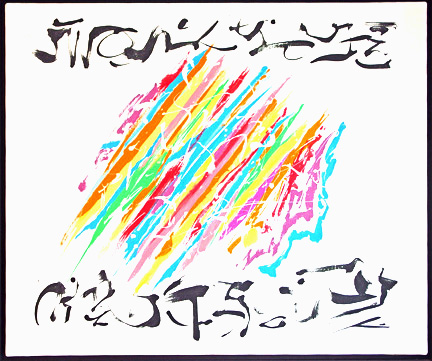Posts Tagged ‘calligraphy’
Word Art
I spent this morning thinking about the intersection of writing and art — how we can be moved by a piece of art that involves words, even when the writing is undecipherable. Or when you are ignorant of the language, as I was recently in Istanbul, where I was captivated by the Arabic script that decorated walls of mosques and palaces.
Last night was the opening celebration in Mendocino for the show “Boundless: Art of Letter, Word and Book,” which curator Janet Self describes as a “hands-on conversation about art, language, books, and engagement in the modern age.” I have several pieces in the show: a poem collaged onto a cast paper fish, the poetry box from my vegetable garden, a handmade book that employs a complex flower-fold structure (suggested by Alisa Golden in “Making Handmade Books”), plus some broadsides and tiny chapbooks.
As I looked around the room, I saw uses of the written word that sparkled with creativity. Janet has posted some pictures on her Flockworks blog site. Among my favorites were “House of Cards,” a walk-in house shape whose walls were linked postcards from all over the world, sent years ago to members of the same family, and inherited by the house-maker. I chatted with Harry Van Ornum, a calligraphy student who, having filled his practice paper with lyrics by a favorite singer, turned the paper sideways and continued, making of the words an abstract form. Janet Self, faced with a huge collection of her father’s Reader’s Digest Condensed Books that no thrift store would take, repurposed the pages into large, flowing geometric sculptures.
My favorite encounter was with a young man who stood entranced in front of a calligraphic painting by the late Jim Bertram, one of the artists who helped found the Mendocino Art Center in the 1960s. It was part of a collection being sold as a fund-raiser for Flockworks, the tiny nonprofit that creates such community art projects as the “Boundless” show.
“Excuse me,” he said. “Can you tell me if that calligraphy is in some language?”
Having met and written about Jim Bertram not long before he died, I was able to tell the young man that no, the beautiful shapes were not words. I told him about the quote I found while researching this artist: Line expresses the inner thought. It is a narrative of what we really want to tell each other but somehow can’t seem to verbalize.
“Now I really want that painting,” the young man responded. “I don’t have any money. But next payday, I’m coming back to buy it.”
Texts
Searoad, a story collection by Ursula K. LeGuin, has a permanent place on my bedside table. It’s there because every now and then I need to reread a certain story. A very short story, less than three pages, it is titled “Texts,” and tells of an older woman who, bombarded by messages and calls to action, retreats to the coastal Oregon village of Klatsand for a month-long winter break. As she walks on the deserted beach, she notices that the waves have left messages in the lines of foam, messages she can almost decipher. The laciness of the foam leads her to speculate that crochet work and lace might also be legible. In a handmade lace collar she reads a message that seems directed to her: “my soul must go, my soul must go … sister, sister, light the light.” There the story ends, with the woman not knowing “what she was to do, or how she was to do it.”
I think of this oddly moving little story every time I walk on Ten Mile Beach, as I did last Sunday. The receding waves left undulating lines of bubbles, iridescent in the hazy sunlight, that popped to form patterns of foam. Scattered across the beach were strands of bull kelp, dried into coils and loops that lay like a cursive script on the sand.
Yesterday, when the wind was brisk and the sea streaked with white caps, I remembered an interview I did for the Mendocino Art Center magazine. It was part of a series I wrote on artists who helped found the art center in the 1960s. By the time I met Jim Bertram in the early 2000s, he was senile and nonverbal, so I had to rely on material in the art center archives for information about his background and artistic vision. Nevertheless, Jim and I spent a wonderful afternoon together. I think a poem I wrote at the time sums it up:
MESSAGES
For JB
“Line expresses the inner thought. It is a narrative of what we really want to tell each other but somehow can’t seem to verbalize.”
– Jim Bertram
These bright spring days, when the wind
scribbles its white calligraphy
on a wash of aquamarine,
I think of the artist in his studio
upstairs of a weathered storefront
overlooking Mendocino Bay.
Sheet after curling sheet he showed me, canvas
after canvas, covered with calligraphic forms
that could have been words, but were not.
In our shared silence I understood his drift:
how sometimes what matters most is inarticulate:
like the line of spray from a lifting wave,
the hand of an old man painting messages of love.
On my way downstairs from Jim’s studio, I fell in love with one of his paintings, which now has a place of honor in my house. I smile when I read its message.

